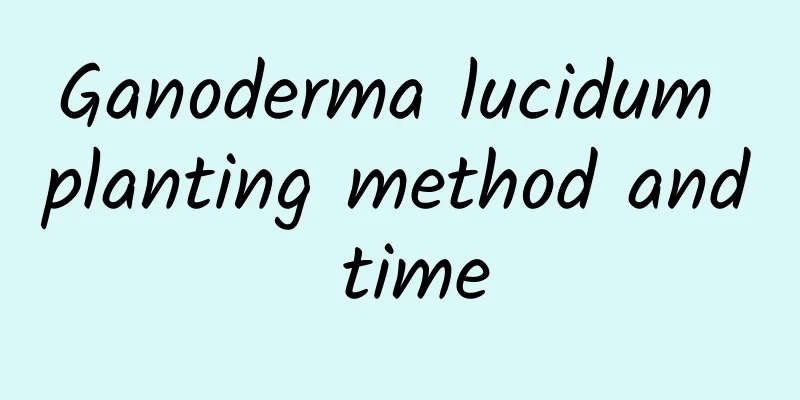Ganoderma lucidum planting method and time

Ganoderma lucidum planting timeGanoderma lucidum can be planted in March. At this time, controlling the humidity is the key. The mushroom sticks should be soaked in water in time. It can also be planted in October in autumn. The temperature should be maintained at 12-15℃ and the air humidity should be maintained at 85%-90%. It can also be planted in January and February in winter, and its quality is best. Planting Lingzhi in SpringThe spring planting time is April, around the Qingming Festival. Ganoderma lucidum needs higher humidity to grow. As the temperature difference between day and night increases, the time it takes for the mycelium to fill the bag will be delayed. Ganoderma lucidum cultivation in summerGanoderma lucidum is a thermophilic fungus and is suitable for growing in an environment of 15-35 degrees. The optimal growth temperature is between 25-30 degrees, so it is most suitable for planting in summer, and the best planting time is July-August. Planting Lingzhi in AutumnGanoderma lucidum can be planted in October in autumn. It likes an environment with good air circulation and needs fresh air throughout the growth and development process, especially the fruiting body growth and development stage, and is more sensitive to carbon dioxide. Planting Lingzhi in WinterGanoderma lucidum is suitable for greenhouse cultivation in winter, and it is best to plant it from January to mid-February. Choose a Ganoderma lucidum greenhouse that is heat-insulating and moisture-retaining, well-ventilated, with adequate light, smooth drainage, and easy management. The floor of the greenhouse must be clean, the walls must be smooth, and the environment must be kept clean. Ganoderma lucidum cultivation methodGanoderma lucidum is mainly maintained indoors. It prefers a dark environment and cannot tolerate direct sunlight, but it cannot be without light, otherwise the color of the fruiting body will be poor. Now it is more often cultivated in outdoor shade sheds. The main methods include short wood cultivation, bag cultivation, etc. Short-segment wood planting is mostly used in the northern region, while bag cultivation is mostly used in the southern region. In bag cultivation, attention should be paid to the specifications of the bags and the tightness. If the material is too loose, the growth will be fast in the early stage, the water retention will be poor in the later stage, the nutrition will be insufficient, and the bacterial benefits will be difficult to form. If the material is too tight, the ventilation will be poor, the mycelium will grow slowly, and the mycelium will be late. |
<<: Can roses be grown in the north?
>>: Can rosemary be planted in the ground?
Recommend
When does orchid bloom? How to grow orchids so they bloom
1. Orchid flowering time The flowering time of or...
The difference between Bauhinia and Plumeria
1. Different varieties Bauhinia and frangipani do...
Can I plant a peach tree outside my door?
Can I make a peach tree outside the door? Peach t...
When should peanuts be planted?
When cultivating peanuts , you should choose a pl...
How to breed bear paw
1. Bud cutting propagation This method has a high...
How to propagate the hanging bamboo plum by cuttings
Cutting medium for hanging bamboo plum Before sel...
Is the thousand-year-old wood the same as the dragon blood tree?
In terms of types First of all, they are of diffe...
Beware of five common diseases when raising sheep in spring
The climate changes greatly in spring, with frequ...
How to grow the succulent plant Jade Fan
Jade fan cultivation lighting Jade fan prefers li...
What to do if the leaves of the black magic master are burnt
1. Cut off the burnt leaves Reason: After the lea...
Does the peacock plant prefer shade or sun?
Does the peacock plant prefer shade or sun? Peaco...
Methods and precautions for propagation of Chlorophytum comosum by cuttings
Chlorophytum cutting time The flowers of the Chlo...
Apply fertilizer frequently when the soil is dry and wet... Several tips for growing flowers, are you doing it right?
See dry and wet (Source: Qiantu.com) This should ...
Breeding techniques and precautions for golden diamonds
The scientific name of the Philodendron philodend...
The difference between firecracker flower and trumpet creeper
Different leaves There are some differences betwe...









